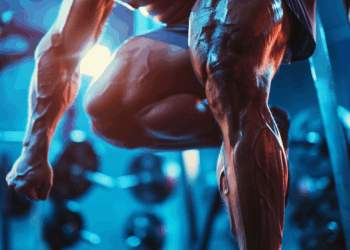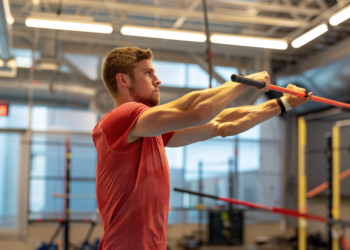Bodybuilders thrive on a keto diet primarily due to its high protein intake and effective appetite control. The emphasis on whole food protein sources supports muscle growth while reducing reliance on calorie-dense supplements. Additionally, keto encourages balanced nutrient intake, helping to retain muscle mass during cutting phases. Meal preparation is simplified, allowing focus on quality ingredients rather than complex recipes. This diet reduces carbohydrate consumption, aiding in appetite regulation and minimizing glucose spikes. Overall, these benefits facilitate an efficient bodybuilding regimen. Exploring further can reveal more insights into the nuances of this diet tailored for serious athletes.
Key Takeaways
- High protein intake on a keto diet supports muscle growth while minimizing reliance on calorie-dense shakes, promoting natural intake from whole foods.
- The keto diet enhances appetite control, reducing cravings and glucose spikes, allowing bodybuilders to maintain energy levels effectively.
- Fast-absorbing protein sources, such as whey and egg whites, aid in rapid muscle recovery post-workout, essential for bodybuilding.
- Prioritizing whole food sources of protein ensures balanced nutrient intake, crucial for muscle retention and overall health in bodybuilders.
- Streamlined meal prep simplifies cooking, allowing bodybuilders to focus on quality ingredients, enhancing adherence to the keto diet.
Keto’s Protein Benefits

When considering dietary strategies for bodybuilding, the keto diet stands out for its protein-positive approach, which greatly benefits muscle building and maintenance.
One of the primary keto advantages is its emphasis on high protein intake, considerably exceeding the average adult’s consumption. This focus on protein strategies not only supports muscle growth but also reduces reliance on calorie-dense shakes and supplements, promoting a more natural intake through whole foods.
By prioritizing quality protein sources, bodybuilders can achieve their fitness goals while minimizing processed food consumption. The keto diet encourages a balanced intake of essential nutrients, fostering an environment conducive to muscle retention and overall health.
This makes it a compelling option for those committed to bodybuilding excellence.
Optimizing Protein Utilization

Optimizing protein utilization is essential for bodybuilders seeking to maximize their muscle gains while adhering to a ketogenic diet. This process involves strategic protein timing and maintaining dietary adherence to enhance muscle recovery and growth.
Consider the following key strategies:
- Prioritize whole food sources of protein.
- Space protein intake throughout the day.
- Incorporate fast-absorbing proteins post-workout.
- Monitor overall macronutrient ratios for balance.
- Stay consistent with meal timing to support metabolic functions.
Simplicity of Meal Prep

Meal preparation can greatly influence the success of a bodybuilding regimen, especially when adhering to a ketogenic diet. The simplicity of meal planning allows bodybuilders to focus on quality ingredient sourcing, prioritizing fresh produce and high-quality proteins over carbohydrate-heavy options.
This streamlined approach minimizes the time spent on complex cooking processes, enabling quick meal options such as pan-fried steak paired with grilled vegetables. Furthermore, investing in quality cookware enhances efficiency, making meal prep less intimidating and more enjoyable.
Fast-Absorbing Protein Sources

Fast-absorbing protein sources play an essential role in the dietary regimen of bodybuilders adhering to a ketogenic diet.
These proteins facilitate peak muscle recovery and growth, aligning with the principles of protein timing and meal frequency. Incorporating these sources guarantees that bodybuilders maximize their anabolic potential while minimizing muscle breakdown.
- Whey protein isolate
- Egg whites
- Greek yogurt
- Cottage cheese
- Lean poultry
Utilizing fast-absorbing proteins helps bodybuilders meet their nutritional needs efficiently.
By strategically timing protein intake around workouts, they can enhance muscle protein synthesis. Additionally, frequent consumption of these protein sources supports sustained energy levels and aids in achieving fitness goals.
This approach allows for a balanced, effective ketogenic diet tailored for muscle development.
Appetite Control Through Carbs

Like avocados, spinach, and nuts, while a contrasting pile of sugary snacks looms in the background, symbolizing appetite control and the keto lifestyle. –v 6 –ar 16:9
Incorporating a ketogenic diet can greatly influence appetite control, particularly through the strategic reduction of carbohydrates. High-carb diets often result in glucose spikes, leading to intense carb cravings and subsequent snacking.
Conversely, a keto approach fosters improved satiety due to its focus on healthy fats and proteins, which provide a greater calorie density per gram. This shift enables bodybuilders to implement effective satiety strategies, helping them maintain energy levels without constant hunger.
Frequently Asked Questions
What Are the Potential Downsides of a Keto Diet for Bodybuilders?
While the ketogenic diet can offer benefits, potential downsides include nutrient deficiencies and the risk of muscle loss due to inadequate carbohydrate intake, emphasizing the importance of a well-rounded approach to dietary planning for peak performance.
How Does the Keto Diet Affect Overall Energy Levels During Workouts?
The keto diet alters energy sources by shifting reliance from carbohydrates to fats, potentially enhancing endurance. However, workout intensity may be affected initially, requiring adaptation time for peak performance and sustained energy levels during workouts.
Can Bodybuilders Consume Alcohol on a Keto Diet?
Approximately 30% of adults on a keto diet report occasional alcohol consumption. Bodybuilders can enjoy keto alcohol types, such as spirits and dry wines, but should prioritize drinking in moderation to maintain their fitness goals effectively.
What Supplements Should Bodybuilders Consider While on Keto?
Bodybuilders on a keto diet should prioritize high-quality protein sources such as whey and eggs while considering supplements for electrolyte balance, including magnesium and potassium, to support muscle function and overall health during low-carb intake.
How Does Keto Impact Recovery Time After Intense Workouts?
Keto recovery acts as a well-tuned engine for muscle rejuvenation, enhancing protein synthesis post-exercise. This low-carb approach stabilizes energy levels and promotes efficient recovery, allowing athletes to rebound more swiftly from intense workouts and optimize performance.
Conclusion
In summary, the ketogenic diet offers significant advantages for bodybuilders by enhancing protein utilization and simplifying meal preparation. While some may argue that carbohydrate intake is essential for energy during intense workouts, research indicates that ketones can serve as an effective alternative fuel source, preserving muscle mass and supporting performance. Ultimately, the strategic application of a keto diet can lead to improved body composition and sustained energy levels, thereby aligning with the goals of serious athletes dedicated to maximizing their physical potential.













